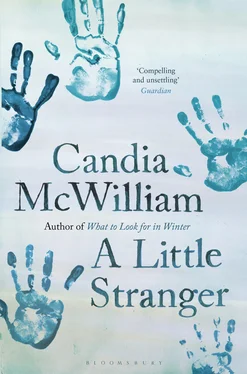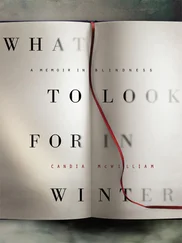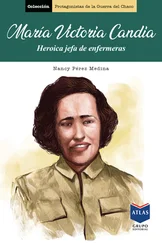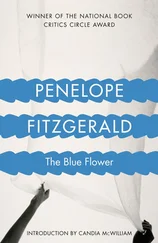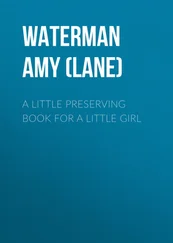Candia McWilliam - A Little Stranger
Здесь есть возможность читать онлайн «Candia McWilliam - A Little Stranger» весь текст электронной книги совершенно бесплатно (целиком полную версию без сокращений). В некоторых случаях можно слушать аудио, скачать через торрент в формате fb2 и присутствует краткое содержание. Год выпуска: 2011, Издательство: Bloomsbury UK, Жанр: Современная проза, на английском языке. Описание произведения, (предисловие) а так же отзывы посетителей доступны на портале библиотеки ЛибКат.
- Название:A Little Stranger
- Автор:
- Издательство:Bloomsbury UK
- Жанр:
- Год:2011
- ISBN:нет данных
- Рейтинг книги:3 / 5. Голосов: 1
-
Избранное:Добавить в избранное
- Отзывы:
-
Ваша оценка:
- 60
- 1
- 2
- 3
- 4
- 5
A Little Stranger: краткое содержание, описание и аннотация
Предлагаем к чтению аннотацию, описание, краткое содержание или предисловие (зависит от того, что написал сам автор книги «A Little Stranger»). Если вы не нашли необходимую информацию о книге — напишите в комментариях, мы постараемся отыскать её.
A Little Stranger — читать онлайн бесплатно полную книгу (весь текст) целиком
Ниже представлен текст книги, разбитый по страницам. Система сохранения места последней прочитанной страницы, позволяет с удобством читать онлайн бесплатно книгу «A Little Stranger», без необходимости каждый раз заново искать на чём Вы остановились. Поставьте закладку, и сможете в любой момент перейти на страницу, на которой закончили чтение.
Интервал:
Закладка:
‘But she’s so careful. About staying separate. Segregated, really. Like a little stranger.’ Whenever childcare was irrelevant, she was not there. ‘I’d thought,’ I continued, tasting the silver mug and its less-cold beer as I smelled their metal and yeast, ‘I’d thought she was wonderful with children, not so good with people.’
‘But children are’ — he used the voice for Churchill and very major profits — ‘they are’ — he felt for the words — ‘children are little people, you know.’
The little person within told its similarity to its father and knocked agreement. The large people about me suggested that he was correct, eating the food of the nursery in preparation for another strenuous afternoon of play. There appeared no crack in the smooth crescent of time which had brought them all here from there, childhood.
Chapter 19
‘Then we went then we went we went.’ John was tired and had run out of memory but not the pleasure of its reverberation. He was in bed, clean as a clam. He had told me town tales every day after school and now it was Friday. Each day the stories were the same; it was important not to get a word wrong. If I pretended to fluff the name of some emporium, John was affronted. His hair had been cut, by a woman who had given him a certificate and a lollipop. The old angel had gone and in his place there was a person who knew brand names and how to tip taxi drivers.
Just as I was sending letters to people unknown, I was by now making jokes to absent listeners. I had always done this a bit, but I had begun rather to degenerate.
‘Give money to men who drive cabs because they are poor,’ had been John’s words. I was outraged and, as is the adult trick, I felt I must make some kind of joke before I showed my anger. I hoped to laugh off a loss of innocence. So I released my limping joke. ‘Tip no further, pretty sweeting.’
‘I’m sorry, I don’t think that’s right,’ said Margaret. She waited for me to kiss John goodnight before doing so herself.
‘I’d bow to your superior knowledge,’ I said, continuing my conversation with the absent listener, not actually replying to Margaret at all. ‘After all, you’ve probably read it more recently than I.’ I even put on a prissy donnish voice for my little put-down of the invisible joke-getter. And it is children who are supposed to invent companions.
‘We had such a lark in London. Tell Mummy about the thing the man said in the restaurant, John,’ said Margaret, unusually chatty.
John looked a bit shirty, then, as a child does who has heard an anecdote several times, he said, ‘In a restaurant where the waiters were all done up for a wedding, you’ll never guess what they said. They said that I took after my mummy and they thought Margaret was my mummy because Daddy says so too. And a lady in a shop said, “Hasn’t he got his mummy’s lovely hair?” Margaret says the Queen went out shopping because there was no flag at the Palace. She shops wearing her crown.’
Below his new feathered fringe his eyes were black as molasses. The rest of his face seemed to be stretching and modifying from babyhood to some more vulnerable because less appealing format. His complexion was changing; there were new waterstains of incipient freckle. They were the first marks on him which would endure throughout his life. In my desk I had, in an envelope given me by Margaret, the barley and sugar of his first hair. He was butting his officer-haircut into his pillow and making a cold star of creases about his head.
Were whimsy and dinkiness replacing imagination for my child, or was this merely a necessary taming? If not the Queen shopping, would it be puppets warring and mice in discothèques? And I actively promoted ironing hedgehogs and conversational caterpillars.
In London, John had been bought some of those pyjamas which presage standing up to pee and being shy about cuddling. Twice already since they returned, I had gone into his room at night and found a bed full of hard toys and his thinning behind escaped from blue and white trousers woven in a neat pinstripe. He had not yet learnt how to tie a bow, but insisted on doing up his own pyjama cord.
Margaret and John had visited parts of London in which you must be a child or very rich in order to sustain the consumption. They had eaten costly burgers and had stood for hours in a queue to see the newest work in wax. They had done everything that a middle American with a good job and no idea of Europe would have done.
I was grateful to Margaret for her stamina and her efficiency. She hadn’t managed to fit in any of the small suggestions I had made, and in a way I was pleased, since that left John and me free to investigate, after the birth of the baby, other Londons, before he came at length to the London of his father. I kissed him good Friday night.
Chapter 20
I had eaten, and was preparing for an evening’s television. I have found that it enlivens an evening’s viewing if you regard the people on the screen as potential recipients of a letter. I wasn’t disappointed, though, when Margaret knocked at the door. I knew it was Margaret because she had recently taken up singing. I thought it was occasioned by tact. She did not care to interrupt me. At what she did not care to interrupt me, I did not know. In case of being surprised apparently doing nothing, I had as a child mastered a series of feints with paper and pencils suggestive of thought, industry and endeavour. This to keep off my mother, who, sure enough, went off, though in her case I need not have tried.
Margaret sang like a radio between stations.
‘Come in. How nice.’ My social manner had gone for so long unaired that it appeared without invitation.
‘I’ll sit down on a chair.’ This, as though I customarily showed her to the Iron Maiden. My temper was getting shorter as I neared the birth.
‘Do, yes. Have a nut.’
Before us, on a low table of leveret-brown wood, were nuts of many varieties, each contained in a bowl of minutely differing lotus-shape, depending upon the contour of the hand of the maker. White, and brushed with unarbitrary calligraphic blue four centuries ago, these bowls composed not a millionth of the richness and discrimination which surrounded us all. They contained pecan nuts, macadamia nuts, almonds hickory smoked and almonds dickory smoked, teak-tree beans from the Amazon, pine nuts from Vallombrosa, and Virgilian chestnuts steeped in sugar. Nuts from ‘a’ to ‘p’, fit for a night in the zenana.
But Margaret was on her diet. Of late it had been consistently maintained, and I must say she was looking trim. Always attentive to detail, she had recently, now the weather was softening, taken to shaving her legs twice a day, and to drawing a line of beige crayon around her mouth, before filling in a lightly hyperbolic bow. How did I know about the double shaving?
Bet, busy with the beautification of the baths’ complexions with their especial scented abrasives, had told me, impressed, no doubt, at Margaret’s industrious attention to groomäing. Pregnancy is, as I say, a democratic state. People tell you things.
These warmer spring-time days, Margaret’s shaven armpits were smooth and dimpled-bald as blown dandelion clocks.
Margaret’s room, the pretty uncluttered room from where the farm and the church were visible, was now thoroughly the room of a modern unmarried girl. She even had a pill-tidy. I looked? I saw. Margaret was perfection, but vigilance must be observed. It cannot too often be stressed that vigilance must be observed. The custodian of your children must be as good as she appears. It was only our good fortune that she was. Her room was still heavily scented with that peculiarly sweet perfume. It overlay all other airs in the room. She was good, and she, by now, almost as though we had been for her a sort of health farm, looked good too. Not mouthwatering, but very marriageable. She looked like a thoroughly passable wartime film star, nourishing. Even her ankles were diminished by diet, and, hardly ever unpropped by heels, they had something of the unferal sexiness of a troopship pin-up. Her hair was longer now and worn in a roll or a soft bow.
Читать дальшеИнтервал:
Закладка:
Похожие книги на «A Little Stranger»
Представляем Вашему вниманию похожие книги на «A Little Stranger» списком для выбора. Мы отобрали схожую по названию и смыслу литературу в надежде предоставить читателям больше вариантов отыскать новые, интересные, ещё непрочитанные произведения.
Обсуждение, отзывы о книге «A Little Stranger» и просто собственные мнения читателей. Оставьте ваши комментарии, напишите, что Вы думаете о произведении, его смысле или главных героях. Укажите что конкретно понравилось, а что нет, и почему Вы так считаете.
